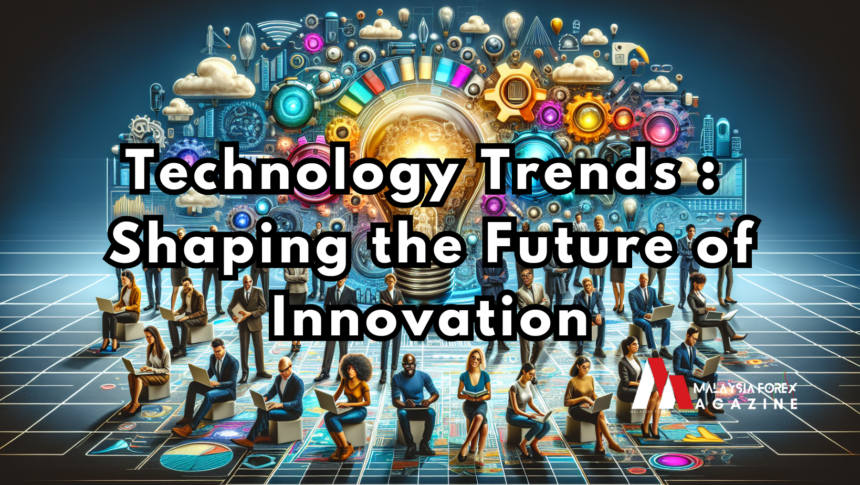As technology continues to evolve at a rapid pace, the trends emerging today are shaping the future of industries, businesses, and everyday life. From artificial intelligence to blockchain and quantum computing, technological advancements are redefining the way we live and work. In this article, we will explore some of the most significant technology trends that are transforming the world and what they mean for the future.
1. Artificial Intelligence and Machine Learning
Artificial Intelligence (AI) and Machine Learning (ML) have become the cornerstone of modern innovation. AI enables machines to mimic human intelligence, while ML allows systems to learn from data and improve over time. These technologies are now embedded in various industries, including healthcare, finance, and retail.
- AI in Healthcare: AI-powered diagnostic tools are improving accuracy and speed in detecting diseases, while robotic surgeries and AI-driven drug discovery are revolutionizing patient care.
- AI in Business: AI algorithms are helping businesses automate processes, improve customer experiences, and optimize operations through predictive analytics and decision-making tools.
The future of AI and ML is poised for further expansion with the integration of more advanced algorithms, natural language processing, and AI ethics discussions aimed at ensuring responsible AI use.
2. 5G Technology
The rollout of 5G networks is set to revolutionize connectivity by providing faster data speeds, lower latency, and increased capacity. This next-generation mobile network will enable new applications across various industries, such as autonomous vehicles, remote surgery, and smart cities.
- Autonomous Vehicles: 5G will play a crucial role in enabling real-time communication between autonomous vehicles and their surroundings, ensuring safer and more efficient transportation systems.
- Smart Cities: With 5G, cities can become more connected and efficient, utilizing IoT devices to manage traffic, reduce energy consumption, and improve public services.
As 5G adoption grows globally, it will drive innovation in industries that rely heavily on data transmission, providing the backbone for the Internet of Things (IoT) and other data-driven technologies.
3. Internet of Things (IoT)
The Internet of Things (IoT) refers to a network of interconnected devices that communicate and exchange data with each other. From smart homes to industrial applications, IoT devices are becoming an integral part of modern life.
- Smart Homes: Devices like smart thermostats, security cameras, and voice-activated assistants are making homes more efficient and convenient. Homeowners can control lighting, temperature, and security systems remotely, thanks to IoT connectivity.
- Industrial IoT: In industries such as manufacturing, IoT is helping companies monitor equipment performance, automate processes, and reduce downtime through predictive maintenance. This connectivity is leading to more efficient and cost-effective operations.
As more devices become connected, IoT will continue to expand its influence, driving innovation in areas like healthcare monitoring, agriculture, and logistics.
4. Blockchain Technology
Blockchain technology is best known for its association with cryptocurrencies like Bitcoin, but its applications go far beyond digital currencies. Blockchain provides a secure and decentralized way to record transactions, making it useful for various industries.
- Finance: Blockchain is transforming financial services by enabling faster, more secure transactions, reducing the need for intermediaries, and lowering transaction costs.
- Supply Chain Management: Blockchain ensures transparency and traceability in supply chains, helping businesses verify the authenticity of products and improve efficiency in tracking goods from production to delivery.
- Healthcare: In healthcare, blockchain can be used to secure patient records, ensuring privacy while enabling seamless sharing of data between healthcare providers.
As industries continue to explore the potential of blockchain, its role in creating secure, transparent, and efficient systems will expand, potentially reshaping sectors like real estate, voting systems, and intellectual property management.
5. Quantum Computing
Quantum computing represents a groundbreaking leap in computational power, far surpassing the capabilities of classical computers. Instead of using binary bits (0s and 1s), quantum computers use qubits that can exist in multiple states simultaneously, enabling them to solve complex problems at unprecedented speeds.
- Scientific Research: Quantum computers can model molecular structures and simulate complex chemical reactions, which has immense potential in drug discovery, materials science, and climate modeling.
- Cryptography: Quantum computing could revolutionize cryptography by rendering traditional encryption methods obsolete, requiring new approaches to data security.
- Optimization Problems: In fields like logistics, finance, and energy, quantum computing can solve optimization problems faster than ever before, potentially saving time and resources.
Although still in its early stages, quantum computing holds the promise of transforming industries by solving problems that are currently impossible for classical computers to tackle.
6. Edge Computing
Edge computing refers to the processing of data closer to where it is generated, reducing latency and improving efficiency. Unlike traditional cloud computing, where data is sent to centralized data centers for processing, edge computing brings computation and storage closer to the devices and sensors that collect the data.
- Autonomous Vehicles: In autonomous vehicles, edge computing allows for real-time data processing from sensors and cameras, enabling quicker decision-making and safer driving.
- Healthcare: In remote healthcare settings, edge computing can enable faster analysis of patient data, improving response times in emergency situations.
- Manufacturing: Factories use edge computing to monitor equipment in real-time, ensuring faster responses to system failures and optimizing production processes.
With the growth of IoT and 5G networks, edge computing will become increasingly important for industries that require real-time data processing and low-latency solutions.
7. Cybersecurity and Privacy Enhancements
As technology advances, the need for robust cybersecurity measures becomes more critical. With the increasing reliance on digital systems, the risk of cyberattacks and data breaches has escalated, prompting organizations to adopt more sophisticated cybersecurity strategies.
- AI in Cybersecurity: AI is being used to detect and prevent cyber threats in real-time, enhancing the ability of organizations to respond to attacks more effectively.
- Zero Trust Architecture: The Zero Trust model emphasizes that no user or device should be trusted by default, even if they are inside the network. This approach is becoming more widespread as organizations seek to protect themselves from both external and internal threats.
- Data Privacy: With growing concerns about data privacy, new regulations such as GDPR are forcing companies to prioritize user privacy and implement stricter data protection measures.
The future of cybersecurity will be shaped by these trends as organizations and governments work to safeguard digital infrastructure and protect personal data.
Conclusion
Technology trends are driving rapid changes across industries, reshaping the way we interact with the world around us. From AI and blockchain to quantum computing and 5G, these innovations are unlocking new possibilities for businesses, governments, and individuals. As these trends continue to evolve, staying informed and adapting to the latest technological advancements will be key to thriving in the increasingly digital future.











